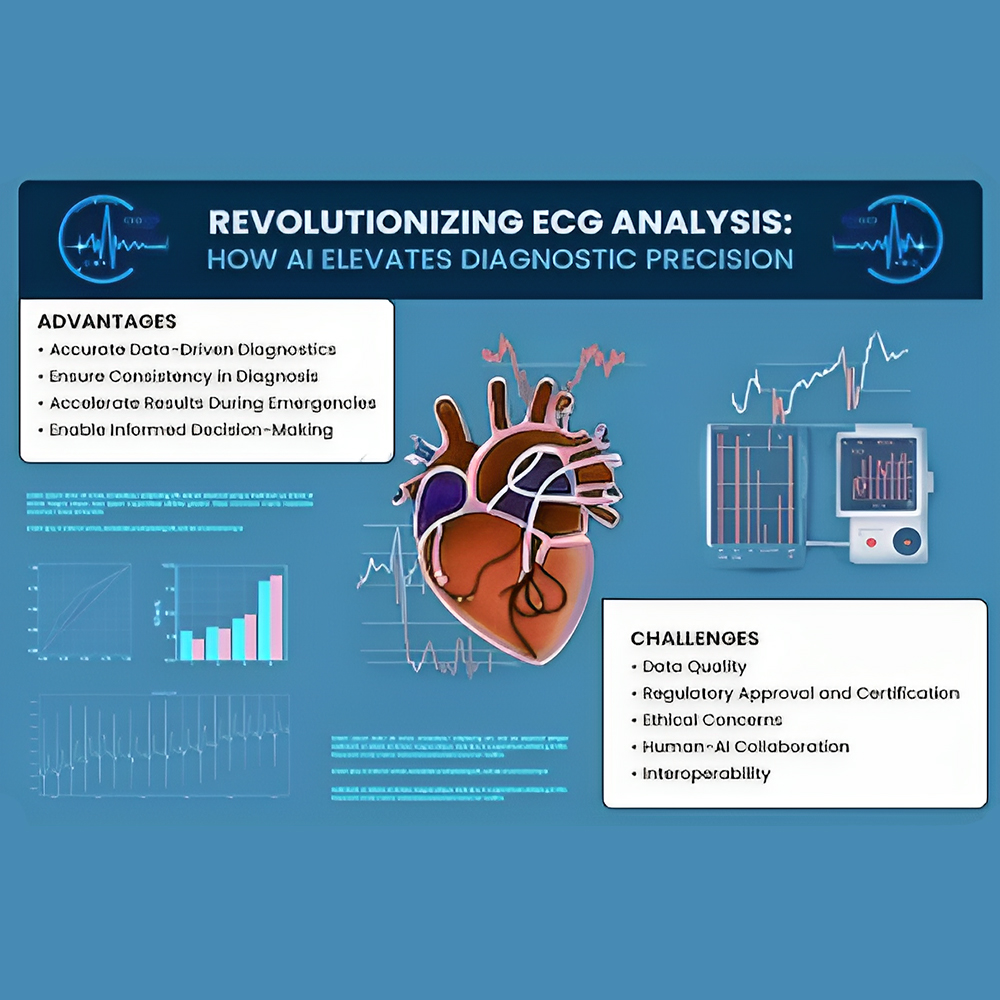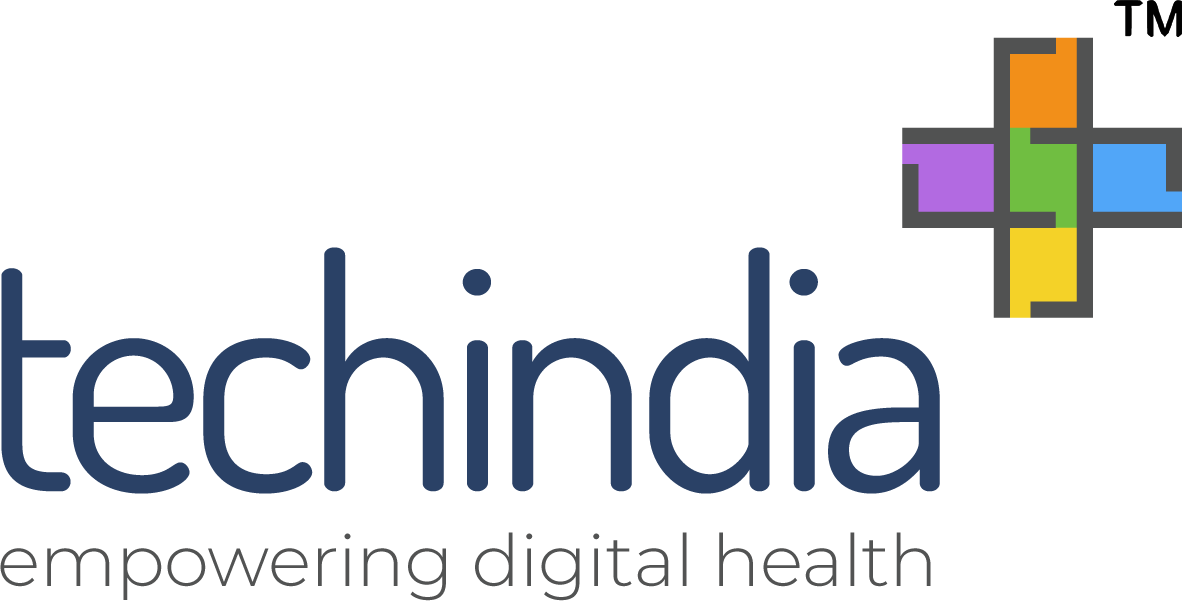- Posted: 23 Nov 2023
- Category: services
- Tag: ECG report management software, ECG rhythm interpretation
Revolutionizing ECG Analysis: How AI Elevates Diagnostic Precision
In the rapidly evolving healthcare landscape, technological advancements redefine how we approach diagnostics and patient care. For decades, manual ECG interpretation has been a part of medical practice. Still, it has faced several challenges to achieve high levels of accuracy due to beat-by-beat eyeball assessment. These limitations are mainly due to algorithm inaccuracy, which significantly influences diagnosis with an increased number of false positives. Additionally, it is highly sensitive to noise, with existing filters susceptible to errors caused by noise and artifacts, particularly high-frequency noise, which can distort ECG waveforms and complicate accurate interpretation.
However, the emergence of AI-powered ECG interpretation, driven by Deep Learning and Machine Learning technology, is transforming the field of cardiology. It promises to significantly enhance diagnostic accuracy, revolutionizing the speed and precision with which cardiac conditions are detected and treated while improving patient outcomes.

ADVANTAGES OF AI IN ECG INTERPRETATION
The integration of Artificial Intelligence (AI) in ECG interpretation offers a transformative solution to many of the challenges associated with traditional methods. AI algorithms, particularly deep learning with neural net technology, can analyze ECG data with remarkable speed, precision, and consistency, surpassing human capabilities.
-
Accurate Data-Driven Diagnostics
One of the primary advantages of AI in ECG interpretation is its enhanced accuracy. It simplifies the growing complexity of ECG interpretation by offering a unique viewpoint garnered by analyzing vast amounts of data. AI algorithms excel in pattern recognition, enabling them to detect even the most subtle abnormalities in ECGs that may elude human observers. These irregularities can often be early warning signs of heart conditions.
Traditional ECG interpretation, while reliant on the expertise of healthcare professionals, is subject to human limitations. Factors such as fatigue, distractions, or variations in the presentation of ECG data can lead to misdiagnosis or the overlooking of essential details. AI systems, on the other hand, are tireless and can meticulously analyze every aspect of the ECG waveform.
AI’s precision is especially crucial in diagnosing cardiac conditions that may have subtle, early warning signs. For example, an AI algorithm can identify minor changes in the ST segment, a crucial parameter in ECG analysis, with remarkable accuracy. This allows healthcare professionals to intervene early, potentially preventing more severe heart issues.
-
Ensure Consistency in Diagnosis
Unlike human interpreters, who are susceptible to various factors that can affect the precision and consistency of their diagnoses, AI systems are tireless, offering consistent results regardless of the workload or time of day. They do not experience fatigue or personal biases. AI can analyze ECG data against a vast database of clinical outcomes. This ensures a more nuanced and accurate diagnosis, considering a range of factors that might be beyond human cognition on time.
Consequently, ECG interpretations provided by AI are consistent, offering the same level of accuracy and attention to detail for every patient, every time. This consistency ensures that patients receive standardized and reliable diagnostic assessments, regardless of when and where they seek medical care.
-
Accelerate Results During Emergencies
Time is often of the essence in situations involving cardiac issues. In life-threatening scenarios, the prompt and precise diagnosis of cardiac issues can be the difference between life and death. AI systems can process and interpret ECGs with lightning speed, delivering near-instantaneous results. During emergencies, this capability is invaluable. It ensures that healthcare professionals can make rapid, well-informed decisions about patient care. Whether identifying a heart attack in progress or assessing the severity of an arrhythmia, AI’s efficiency can significantly impact patient outcomes.
-
Enable Informed Decision-Making
AI-powered ECG interpretation is a valuable tool for healthcare professionals, complementing their knowledge and experience. One of the key ways in which AI enhances human decision-making is by highlighting potential areas of concern in ECGs. When an AI system interprets an ECG, it provides a diagnosis and highlights specific features or patterns that may require further attention. This empowers healthcare professionals to make more informed decisions regarding patient care. They can quickly assess the AI’s findings, validate them against their clinical expertise, and act accordingly.
Moreover, AI can assist in educational efforts by serving as a teaching tool. AI-assisted ECG interpretations can enhance the educational experience for medical students and trainees, allowing them to engage with diverse cases and refine their diagnostic abilities.
CHALLENGES
While this integration has shown tremendous promise, it’s not without challenges. Here are a few key points to keep in mind:
-
Data Quality:
The accuracy and efficiency of AI algorithms depend on the quality and diversity of the data used for training. Ensuring that AI systems can access a broad spectrum of ECGs, including rare and atypical cases, is essential to improving their diagnostic accuracy.
-
Regulatory Approval and Certification:
The deployment of AI in medical diagnostics requires rigorous validation and regulatory approval with frameworks such as HIPAA to ensure its safety and efficacy. Collaboration between technology developers and healthcare regulatory bodies is essential to maintain continuous compliance.
-
Ethical Concerns:
AI in healthcare also sparks ethical concerns, including patient privacy, data security, and the transparency of AI decision-making processes. Using AI systems responsibly and respecting patient rights is of utmost importance.
-
Human-AI Collaboration:
Striking the right balance between human expertise and AI support is a challenge that healthcare organizations must navigate. Training healthcare professionals to effectively work alongside AI systems is critical to realizing the full potential of this technology. While the potential benefits of AI-powered ECG interpretation are vast, several challenges must be addressed for successful integration into healthcare systems.
-
Interoperability:
Seamless integration of AI-powered ECG interpretation tools into existing healthcare systems is crucial for widespread adoption. However, ensuring compatibility with a variety of electronic health record (EHR) platforms and healthcare IT infrastructure can pose a significant challenge.
Incorporating AI into ECG interpretation represents a transformative shift in cardiac diagnostics and patient care. AI can improve precision, maintain consistency, deliver prompt results, and provide crucial decision support, reshaping the healthcare landscape. Despite existing challenges, such as the standardization of ECG interpretation and the necessity for increased contextualization, the benefits of AI are undeniable.
As AI continues to advance, the future of ECG interpretation looks promising. Ongoing research and development are making AI algorithms even more sophisticated, expanding their capabilities to identify a broader range of cardiac conditions with greater accuracy. By considering individual patient data and incorporating machine learning insights, cardiologists can tailor treatment plans to address specific patient needs, ultimately improving patient outcomes.
Recent Post

We're helping some of the most respected names in healthcare deliver measurably better outcomes. Let us show you what personally Human & AI integrated solution can do for your organization. While filling the form, please fill in the information more specifically that you are looking for.
Thank you for your query! We will get back to you shortly!!

